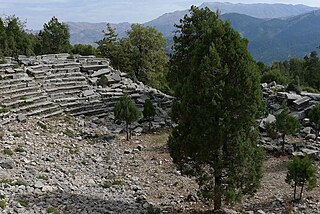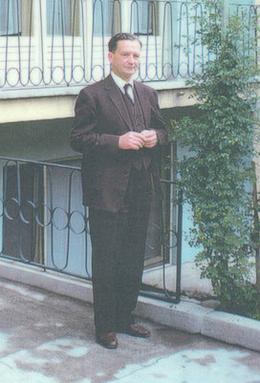
The Hittites were an Anatolian people who played an important role in establishing first a kingdom in Kussara, then the Kanesh or Nesha kingdom, and next an empire centered on Hattusa in north-central Anatolia. This empire reached its height during the mid-14th century BC under Š

Troy or Ilion was an ancient city located in present-day Hisarlik, Turkey. It is best known as the setting for the Greek myth of the Trojan War. The archaeological site is open to the public as a tourist destination, and has been added to the UNESCO World Heritage list as of 1998.

The Anatolian languages are an extinct branch of Indo-European languages that were spoken in Anatolia, part of present-day Turkey. The best known Anatolian language is Hittite, which is considered the earliest-attested Indo-European language.

James Mellaart FBA was an English archaeologist and author who is noted for his discovery of the Neolithic settlement of Çatalhöyük in Turkey. He was expelled from Turkey when he was suspected of involvement with the antiquities black market. He was also involved in a string of controversies, including the so-called mother goddess controversy in Anatolia, which eventually led to his being banned from excavations in Turkey in the 1960s. After his death it was discovered that he had forged many of his "finds", including murals and inscriptions used to discover the Çatalhöyük site.

Luwian, sometimes known as Luvian or Luish, is an ancient language, or group of languages, within the Anatolian branch of the Indo-European language family. The ethnonym Luwian comes from Luwiya – the name of the region in which the Luwians lived. Luwiya is attested, for example, in the Hittite laws.

The Anatolian Plate is a continental tectonic plate that is separated from the Eurasian plate and the Arabian plate by the North Anatolian Fault and the East Anatolian Fault respectively. Most of the country of Turkey is located on the Anatolian plate. Most significant earthquakes in the region have historically occurred along the northern fault, such as the 1939 Erzincan earthquake. The devastating 2023 Turkey–Syria earthquake occurred along the active East Anatolian fault at a strike slip fault where the Arabian plate is sliding past the Anatolian plate horizontally.

The Journal of Hellenic Studies is an annual peer-reviewed academic journal covering research in Hellenic studies. It also publishes reviews of recent books of importance to Hellenic studies. It was established in 1880 and is published by Cambridge University Press on behalf of the Society for the Promotion of Hellenic Studies. The editor-in-chief is Lin Foxhall. According to the Journal Citation Reports, the journal has a 2022 impact factor of 0.1.

The Anatolian hypothesis, also known as the Anatolian theory or the sedentary farmer theory, first developed by British archaeologist Colin Renfrew in 1987, proposes that the dispersal of Proto-Indo-Europeans originated in Neolithic Anatolia. It is the main competitor to the Kurgan hypothesis, or steppe theory, which enjoys more academic favor.

Oenoanda or Oinoanda was a Lycian city, in the upper valley of the River Xanthus. It is noted for the philosophical inscription by the Epicurean, Diogenes of Oenoanda.
Alan Greaves is a lecturer at the University of Liverpool, UK, who specialises in the Bronze and Iron Ages of Anatolia.

The China Quarterly (CQ) is a British double-blind peer-reviewed academic journal established in 1960 on contemporary China including Taiwan.

Geldibuldu is a village in the Kâhta District, Adıyaman Province, Turkey. It had a population of 685 in 2021. The village is populated by Kurds of the Gewozî tribe.

Winifred Lamb was a British archaeologist, art historian, and museum curator who specialised in Greek, Roman, and Anatolian cultures and artefacts. The bulk of her career was spent as the honorary keeper (curator) of Greek antiquities at the University of Cambridge's Fitzwilliam Museum from 1920 to 1958, and the Fitzwilliam Museum states that she was a "generous benefactor ... raising the profile of the collections through groundbreaking research, acquisitions and publications."
History in Africa: A Journal of Debates, Methods, and Source Analysis is an annual peer-reviewed academic journal covering the historiography and methodology of African history. It is published by Cambridge University Press on behalf of the African Studies Association. The editor-in-chief is Lorelle D. Semley, a historian at College of the Holy Cross. Other editors of the journal include Teresa Barnes, Bayo Holsey, and Egodi Uchendu .

Professor Roger Matthews is head of department in the department of archaeology at the University of Reading. Matthews was previously with the UCL Institute of Archaeology. From 1988 to 1995, Matthews was director of the British School of Archaeology in Iraq, and from 1996 to 2001 he was director of the British Institute of Archaeology at Ankara.

Kilise Tepe is a mound in Mersin Province, Turkey, just west of the Göksu River, lying 20 kilometers from Mut and 145 kilometers from Mersin. It was initially known as Maltepe which is actually the name of a site on the other bank of the river about four kilometers to the west. The original name of the mound is not known and Kilise Tepe in Turkish means "church-hill" referring to a church ruin. The site is thought to have been part of the land of Tarḫuntašša, formed when Muwatalli II moved the Hittite capital.

The British Institute at Ankara (BIAA), formerly British Institute of Archaeology at Ankara, is a research institute that supports, promotes, and publishes research into the humanities and social sciences of Turkey and the Black Sea region. The institute was founded in 1947 and became legally incorporated in 1956 as part of a cultural agreement between the Republic of Turkey and the United Kingdom. The institute is a UK registered charity and part of the British Academy's Overseas Institutes. The institute has an office in based in Ankara, where it maintains a library, research facilities, and accommodation for visiting scholars. It also has a London office.

Michael Richard Edward Gough was a British archaeologist and the third Director of the British Institute of Archaeology at Ankara (1961-1968). As Director of the BIAA Gough pioneered the archaeology of early Christian sites in Turkey in anticipation of changes in academic viewpoints which were to follow in the 1990s.
David Crampton Winfield MBE was a British conservator and Byzantinist who specialised in wall paintings. The first part of his career was spent abroad, mainly in Turkey and Cyprus, and he was awarded an MBE in 1974 for his conservation work in Cyprus. In his obituary in The Times, David Winfield was described as “an investigative archaeological explorer cast in the mould of the great 19th-century scholar-travellers”.
Lutgarde Vandeput is the Director of the British Institute at Ankara.














